How office workers in Leeds are learning how to keep urban bees
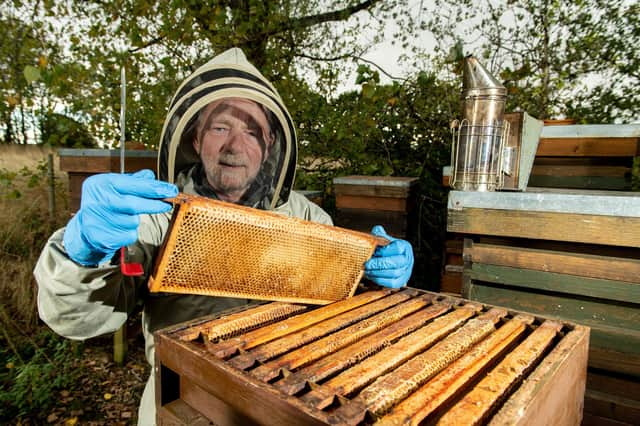

Cadmore is the author of the aforementioned book to which he refers, Notes for new Beekeepers. It is his second book published by Northern Bee Books, one of the biggest publishers of beekeeping books in Europe, and is due to be launched at the National Honey Show in London, which runs from October 27 to 29. “It was already written, it was a matter of editing it all and proof-reading it five times,” he says, modestly.
At 70, Cadmore’s expertise and knowledge has been well practised since his introduction to the wonderful world of beekeeping came from a neighbour who nurtured his interest back in 1984.
Advertisement
Hide AdAdvertisement
Hide AdSoon he had his own hive and, subsequently, is now the proud owner of 79 – hives that is – each containing a colony of 50,000 bees.
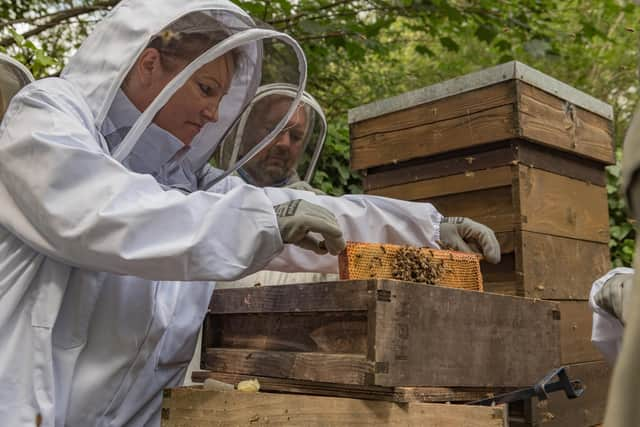

It is a hobby which, as you can imagine, keeps him extremely busy at a time when he hints that he would rather be slowing down.
Still, there is plenty to do and one of the most important tasks for him is to encourage and educate others who want to become part of this rewarding pastime.
The importance of bees as pollinators is paramount. They are a crucial contributor to the food chain and, of course, the benefits of honey are boundless for health and well-being.
Advertisement
Hide AdAdvertisement
Hide AdSo, with all focus on sustainability, it’s no surprise that the courses Cadmore and his fellow beekeepers run through the Bradford Beekeepers Association are constantly in demand. More than 30 people – from all professions and walks of life – have attended the courses in the past year and many more have signed up for next year.
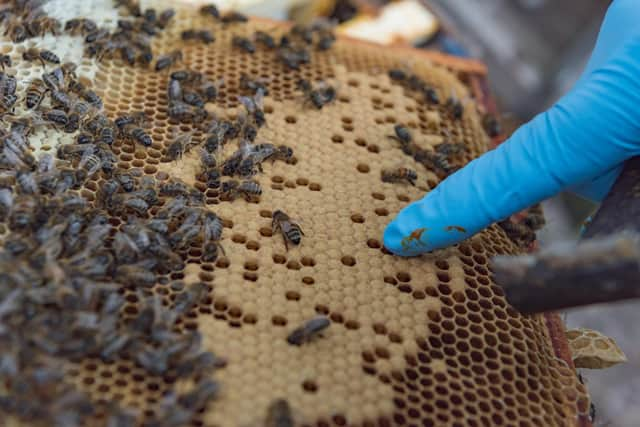

“We have become much more diverse in terms of male, female spread and ethnic groups as well. It is no longer a white middle class occupation for men,” says Cadmore, the association’s chairman.
Originally set up in the Seventies, the association reformed in 2010. It now has 148 members and is one of the largest in the entire country.
Over the years the association has worked closely with local schools and the community, and is now expanding its scope within the corporate world following an increase in interest in urban beekeeping.
Advertisement
Hide AdAdvertisement
Hide AdCadmore was contacted by developer and asset manager MEPC when the firm began creating the mixed-use development at Wellington Place, Leeds.
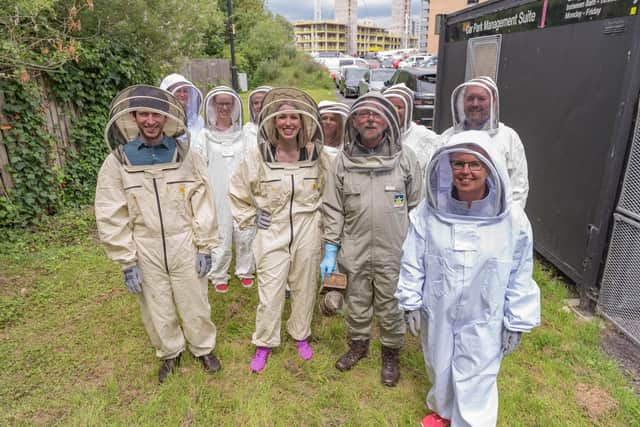

“We invited Bill Cadmore to set up an on-site apiary when Wellington Place was in its early development stage,” says Dominique Murray, head of customer experience and marketing manager at MEPC.
"We understand the vital role that bees play in our ecosystem, as pollinators of 75 per cent of the world’s plants, and wanted to increase awareness of this by encouraging the Wellington Place community to try their hand at beekeeping,”
“Sustainability has always been a priority for us at Wellington Place, and we practise sustainability, not just through our buildings but also through a range of community initiatives including our urban gardens, bug hotels and, of course, our beehives.”
Advertisement
Hide AdAdvertisement
Hide AdContrary to the perception that bees prefer the countryside, there is actually more fodder to be found in an urban setting.
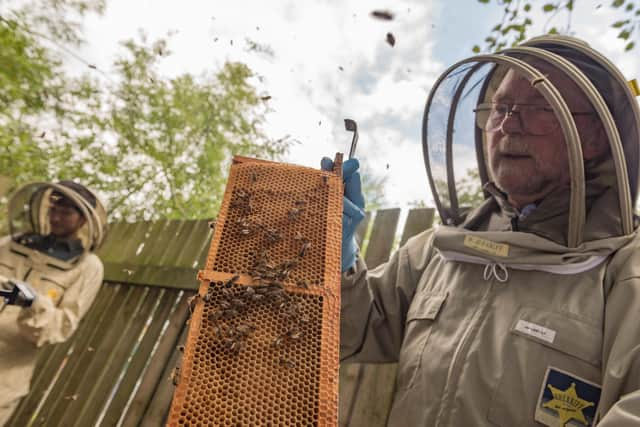

“They do much better in cities than they do in the countryside because there is food from April to September in the cities,” says Cadmore. “If you think about driving through the countryside, it’s either grass for horses, cattle or sheep, which is not good for bees, or wheat. Only farmers are growing oilseed rape and there are only a few flowers in the hedgerows for bees to feed on.
"But in the city you have all the parks and gardens and verges, even the grow bags that the city council have put on the top of bus stops – there is plenty of food in the city.”
In 2009 he set up his first apiary at Wellington Place. Over the years, as development of the site continued, his apiary was relocated to the nearby riverbank.
Advertisement
Hide AdAdvertisement
Hide Ad“We started in the summer months occasional beekeeping for office workers at lunchtimes,” adds Cadmore.
The sessions became so popular that each year since they have been over-subscribed as more people take an interest in sustainable living.
“I think the reasons are firstly it is there and it is an opportunity to have a look at something that is fairly unique and not something you are going to do every day. Everybody is interested in sustainability and nature.”
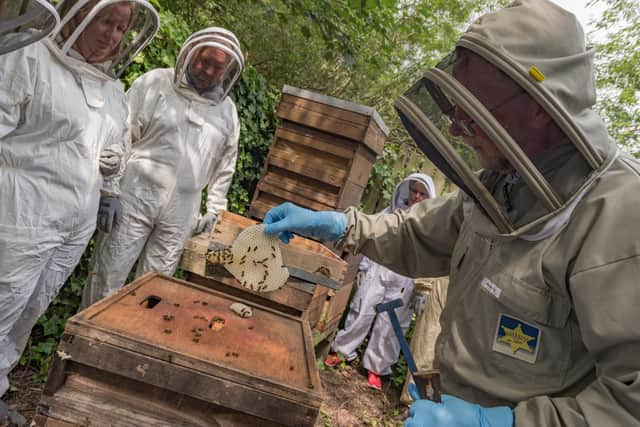

Groups of workers don bee-suits to participate in hands-on sessions held during the summer months.
Advertisement
Hide AdAdvertisement
Hide AdThere are 75 colonies on site – amounting to around 350,000 bees at the height of summer.
“The office workers turn up at the start of their lunch break, put on the bee-suits and spend half an hour with me and they do the beekeeping, not me, I tell them what to do. They get to hold the frames – we get them stuck in straightaway and do a bit of a debrief afterwards,” he says.
More than 30 businesses are based at Wellington Place, ranging from finance and law to digital and recruitment.
“The main benefit from the sessions is it gives us the ability to bring people from different companies together to network whilst enjoying a unique shared experience,” says Murray.
Advertisement
Hide AdAdvertisement
Hide Ad“We wanted to further raise awareness of the importance of bees to our integrated ecosystem and provide something new and different for people to do on their lunchbreak. Beekeeping was a perfect solution as not only is it great for making people more environmentally conscious, it’s also proven to reduce stress and contribute to overall wellbeing.”
Considering this summer was one of the hottest on record, it’s interesting to know the impact the weather had on the bees.
“The start of the year was really really good for them. Almost every colony wanted to swarm so beekeepers had to split colonies. I had cut down from 80,000 to 35,000. I started the year with 35,000 but ended up with 79,000 because the weather was so good, plentiful food in spring into May so bees take the opportunity to reproduce when things are good,” says Cadmore.
The honey and other beeswax products, such as candles and hand cream, produced from the hives at Wellington Place are sold at on-site market events. Honey samples are also given as gifts.
Advertisement
Hide AdAdvertisement
Hide AdThe Wellington Place apiary was also used for research into bee diseases in collaboration with the University of Leeds.
As well as working with Wellington Place, Cadmore has been contacted by a firm of Bradford solicitors who are keen to help out at the association’s apiary in Tong Street, Bradford, as part of their voluntary work within the local community.
He says a popular reason for people taking up beekeeping is to produce a natural food themselves. “People are looking for a pure clean food they can produce, and this year has been really good because almost all the beginners have got a good honey crop.”
However, sustainability isn’t the only benefit – beekeeping is good for well-being too. “It is as good as meditation because when you are looking through a hive the rest of the world ceases to exist. It’s just you and seeing what the bees are doing,” says Cadmore. “It is stepping out of your normal life into another realm.”
www.bradfordbeekeepers.co.uk